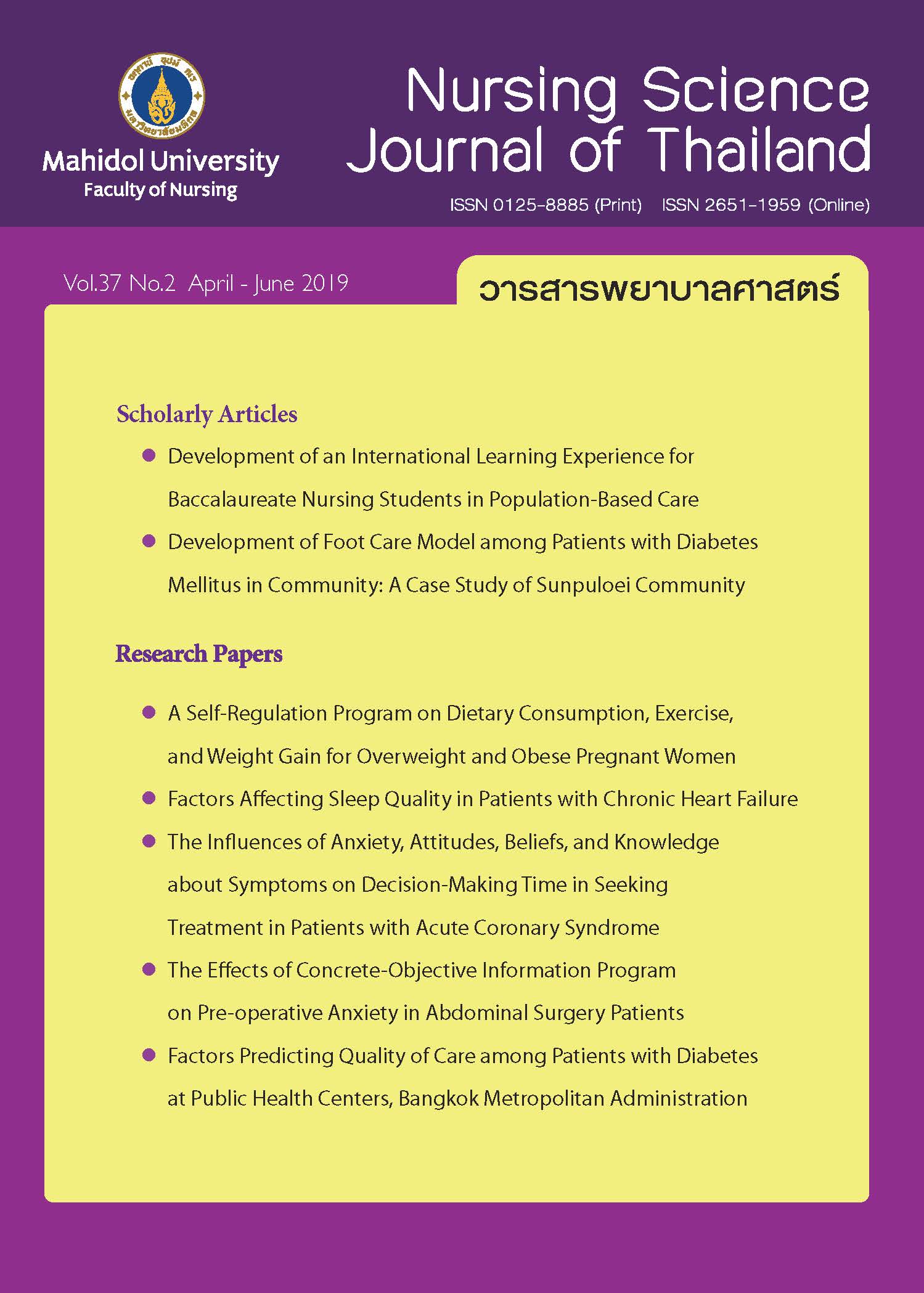อิทธิพลของความวิตกกังวล เจตคติ ความเชื่อ และความรู้เกี่ยวกับอาการต่อระยะเวลาการตัดสินใจมารับการรักษาในผู้ป่วยภาวะหัวใจขาดเลือดเฉียบพลัน
Main Article Content
บทคัดย่อ
วัตถุประสงค์: เพื่อศึกษาอิทธิพลของความวิตกกังวล เจตคติ ความเชื่อ และความรู้เกี่ยวกับอาการต่อระยะเวลาการตัดสินใจมารับการรักษาในผู้ป่วยภาวะหัวใจขาดเลือดเฉียบพลัน
รูปแบบการวิจัย: การศึกษาความสัมพันธ์เชิงทำนาย
วิธีดำเนินการวิจัย: กลุ่มตัวอย่างเป็นผู้ป่วยภาวะหัวใจขาดเลือดเฉียบพลันที่เข้ารับการรักษาโรงพยาบาลตติยภูมิ 2 แห่งในเขตกรุงเทพมหานคร และปริมณฑล จำนวน 179 ราย เก็บรวบรวมข้อมูลโดยใช้แบบสอบถามข้อมูลส่วนบุคคล ข้อมูลภาวะสุขภาพ และระยะเวลาตั้งแต่เกิดอาการจนมาถึงโรงพยาบาล แบบวัดความวิตกกังวล และแบบประเมินดัชนีการตอบสนองต่อภาวะหัวใจขาดเลือดเฉียบพลันวิเคราะห์ข้อมูลด้วยสถิติเชิงพรรณนา และสถิติการวิเคราะห์ถดถอยโลจิสติคแบบขั้นตอนเดียว
ผลการวิจัย: กลุ่มตัวอย่างมีค่ามัธยฐานของระยะเวลาการตัดสินใจมารับการรักษาเท่ากับ 66 นาที โดยความวิตกกังวล เจตคติ ความเชื่อ และความรู้เกี่ยวกับอาการสามารถร่วมกันอธิบายความแปรปรวนของระยะเวลาการตัดสินใจมารับการรักษาในผู้ป่วยภาวะหัวใจขาดเลือดเฉียบพลันได้ร้อยละ 38.7 โดยปัจจัยที่มีอิทธิพลต่อระยะเวลาการตัดสินใจมารับการรักษา ได้แก่ ความรู้เกี่ยวกับอาการในระดับสูงมาก (OR = 26.26, 95%CI = 2.60, 264.97) ความเชื่อเกี่ยวกับอาการที่เหมาะสม (OR = 4.97, 95%CI = 1.09, 22.72) เจตคติเกี่ยวกับอาการที่เหมาะสม (OR = 2.42, 96%CI = 1.05, 5.59) และความวิตกกังวลในระดับต่ำ (OR = .12, 95%CI = .03, .47)
สรุปและข้อเสนอแนะ: ปัจจัยดังกล่าวทั้งหมดมีอิทธิพลต่อระยะเวลาการตัดสินใจมารับการรักษา ดังนั้นพยาบาลควรให้ความรู้เกี่ยวกับอาการของภาวะหัวใจขาดเลือดเฉียบพลันแก่ผู้ป่วย และกลุ่มเสี่ยง โดยเน้นทั้งอาการที่เฉพาะเจาะจง ไม่เฉพาะเจาะจง และอาการร่วมของภาวะหัวใจขาดเลือดเฉียบพลัน พร้อมทั้งส่งเสริมเจตคติ และความเชื่อเกี่ยวกับอาการที่เหมาะสม เพื่อจะส่งเสริมให้ผู้ป่วยตัดสินใจมารับการรักษาที่เร็วยิ่งขึ้น
Article Details
ลิขสิทธิ์: วารสารพยาบาลศาสตร์เป็นเจ้าของลิขสิทธิ์ในการเผยแพร่ผลงานที่ตีพิมพ์ ห้ามผู้ใดนำบทความที่ได้รับการตีพิมพ์ในวารสารพยาบาลศาสตร์ไปเผยแพร่ในลักษณะต่างๆ ดังต่อไปนี้ การส่งบทความไปตีพิมพ์เผยแพร่ที่อื่น การนำบทความเผยแพร่ออนไลน์ การถ่ายเอกสารบทความเพื่อกิจกรรมที่ไม่ใช่การเรียนการสอน ยกเว้นเสียแต่ได้รับอนุญาตจากวารสารพยาบาลศาสตร์

Disclaimer: เนื้อหาบทความหรือข้อคิดเห็นใดๆ ในวารสารพยาบาลศาสตร์ ถือเป็นความรับผิดชอบของผู้เขียน กองบรรณาธิการไม่จำเป็นต้องเห็นด้วยและไม่มีส่วนรับผิดชอบแต่อย่างใด
เอกสารอ้างอิง
2. Kloner RA, Jennings RB. Consequences of brief ischemia: stunning, preconditioning, and their clinical implications: part 2. Circulation. 2001;104(25):3158-67.
3. Alshahrani H, McConkey R, Wilson J, Youssef M, Fitzsimons D. Female gender doubles pre-hospital delay times for patients experiencing ST segment elevation myocardial infarction in Saudi Arabia. Eur J Cardiovasc Nurs. 2014;13(5):399-407.
4. Orksuk L, Ruisungnoen W. Perception of symptoms and decision to seek treatment in patients with acute coronary syndrome. Journal of Nurses’ Association of Thailand, North-Eastern Division. 2555;30(2):89-97. (in Thai).
5. Deeoum C. Annual epidemiological surveillance report 2017 [Internet]. Nonthaburi: Bureau of Epidemiology, Department of Disease Control, Ministry of Public Health; 2017 [cited 2019 Mar 6]. Available from: http://203.157.15.110/boeeng/annual.php. (in Thai).
6. Hengrassamee K, Jamsomboon K. Standardized treatment of acute coronary syndrome. Bangkok: Sukhumvit Printing; 2012. (in Thai).
7. Dracup K, McKinley S, Riegel B, Mieschke H, Doering LV, Moser DK. A nursing intervention to reduce prehospital delay in acute coronary syndrome: a randomized clinical trial. J Cardiovasc Nurs. 2006;21(3):186-93.
8. Spielberger CD. Anxiety and behavior. New York: Academic Press; 1966.
9. Herlitz J, Thuresson M, Svensson L, Lindqvist J, Lindahl B, Zedigh C, et al. Factors of importance for patients' decision time in acute coronary syndrome. Int J Cardiol. 2010;141(3):236-42.
10. Thepphawan P, Wattanakitkrileart D, Pongthavornkamol K, Dumavibhat C. Cognitive representation, emotional responses and hospitalization experience in predicting decision making for receiving treatment among patients with acute coronary syndrome. Journal of Nursing Science. 2011;29 Suppl 2:111-9. (in Thai).
11. Allana S, Khowaja K, Ali TS, Moser DK, Khan AH. Gender differences in factors associated with prehospital delay among acute coronary syndrome patients in Pakistan. J Transcult Nurs. 2015;26(5):480-90.
12. Abed MA, Khalil AA, Moser DK. The contribution of symptom incongruence to prehospital delay for acute myocardial infarction symptoms among Jordanian patients. Res Nurs Health. 2015;38(3):213-21.
13. Riegel B, McKinley S, Moser DK, Meischke H, Doering L, Dracup K. Psychometric evaluation of the acute coronary syndrome (ACS) response index. Res Nurs Health. 2007;30(6):584-94.
14. O’Brien F, O’Donnell S, McKee G, Mooney M, Moser D. Knowledge, attitudes, and beliefs about acute coronary syndrome in patients diagnosed with ACS: an Irish cross-sectional study. Eur J Cardiovasc Nurs. 2013;12(2):201-8.
15. Darawad MW, Alfasfos N, Saleh Z, Saleh AM, Hamdan-Mansour A. Predictors of delay in seeking treatment by Jordanian patients with acute coronary syndrome. Int Emerg Nurs. 2016;26:20-5.
16. McKee G, Mooney M, O'Donnell S, O'Brien F, Biddle MJ, Moser DK. Multivariate analysis of predictors of pre-hospital delay in acute coronary syndrome. Int J Cardiol. 2013;168(3):2706-13.
17. Albarqouni L, Smenes K, Meinertz T, Schunkert H, Fang X, Ronel J, et al. Patients’ knowledge about symptoms and adequate behaviour during acute myocardial infarction and its impact on delay time: findings from the multicentre MEDEA Study. Patient Educ Couns. 2016;99(11):1845-51.
18. Khan MS, Jafary FH, Faruqui AM, Rasool SI, Hatcher J, Chaturvedi N, et al. High prevalence of lack of knowledge of symptoms of acute myocardial infarction in Pakistan and its contribution to delayed presentation to the hospital. BMC Public Health. 2007;7:284.
19. Kanbuala W, Samartkit N, Keeratiyutawong P. Factors related to decision time for seeking treatment in patients with myocardial infarction. Nursing Journal of the Ministry of Public Health. 2014;24(2):21-36.
20. Brodaty H, Pond D, Kemp NM, Luscombe G, Harding L, Berman K, et al. The GPCOG: a new screening test for dementia designed for general practice. J Am Geriatr Soc. 2002;50(3):530-4.
21. Griffiths J, Putthinoi S, Pongsaksri M. The general practitioner assessment of cognition; GPCOG (Thai version): validity and reliability. Poster session presented at: Rewinding the aging clock. 9th Pan-Pacific Conference on Rehabilitation cum, 21st Annual Congress of Gerontology; 2014 Nov 29-30; Jockey Club Auditorium, the Hong Kong Polytechnic University. Hong Kong, China.
22. Chlan LL. Relationship between two anxiety instruments in patients receiving mechanical ventilatory support. J Adv Nurs. 2004;48(5):493-9.
23. Juangpanich U, Onbunreang J, Khansorn T, Lunlud J, Vatanasapt P. Effect of music therapy on anxiety and pain in cancer patients. Journal of Nurses’ Association of Thailand, North-Eastern Division. 2012;30(1):46-52. (in Thai).
24. Roffi M, Patrono C, Collet JP, Mueller C, Valgimigli M, Andreotti F, et al. 2015 ESC Guidelines for the management of acute coronary syndromes in patients presenting without persistent ST-segment elevation: task force for the management of acute coronary syndromes in patients presenting without persistent ST-segment elevation of the European Society of Cardiology (ESC). Eur Heart J. 2016;37(3):267-315.
25. Krairatcharoen N, Lekutai S, Pongthavornkamol K, Satayawiwat W. Factors influencing the decision making to seek treatment of patients with acute myocardial infarction. Journal of Nursing Science. 2010;28(2):49-57. (in Thai).
26. Bohplian S, Pinyopasakul W, Sareewiwatthana P, Charoenkitkarn V. The relationship among age, health insurance coverage, perceived social support and time to hospital arrival in patients with coronary artery disease. Journal of The Royal Thai Army Nurses. 2011;12(3):84-90. (in Thai).


